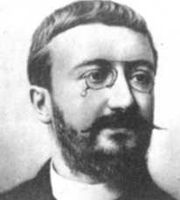Assessment |
Biopsychology |
Comparative |
Cognitive |
Developmental |
Language |
Individual differences |
Personality |
Philosophy |
Social |
Methods |
Statistics |
Clinical |
Educational |
Industrial |
Professional items |
World psychology |
Educational Psychology: Assessment · Issues · Theory & research · Techniques · Techniques X subject · Special Ed. · Pastoral

Binet could be considered the first school psychologist
School Psychology is a field that applies principles of clinical psychology and educational psychology to the diagnosis and treatment of students' behavioral and learning problems. School psychologists are educated in child and adolescent development, learning theories, psychoeducational assessment, personality theories, therapeutic interventions, identification of learning disability; and the ethical, legal and administrative codes of their profession.
Historical highlights
School psychology began mainly through the testing movement, in the late 1800’s, especially from people like Alfred Binet. Binet’s work resembled school psychology of today, because he developed the first IQ test to screen children who would not benefit from regular education. Binet’s test was brought to the U.S. in the early 1900’s, and was standardized in 1916 by Lewis Terman of Stanford. Today it is known has the Stanford-Binet test. In 1975, The U.S. Public Law 94-142 (Education of All Handicapped Children Act, or EHA) mandates the free and appropriate education of all individuals from 3-21 years of age. This act requires that all children should attend school, including children who often would not receive any advantages of public education in the past due to their disability. Its principles were reaffirmed and strengthened in the Individuals with Disabilities Education Act (IDEA), and Individuals with Disabilities Education Improvement Act (IDEIA). Hence, in the U.S. the profession of school psychology flourished as these children needed additional support to be included in the regular school setting. This combined with years of lawsuits and litigations allowed the profession to flourish (Graduate School of Education, 2003).
Theoretical framework and services
According to Division 16 (Division of School Psychology), of the American Psychological Association (APA) school psychologists operate according to a scientific framework. They work to promote effectiveness and efficiency in the field. School psychologist conduct psychological assessments, provide brief interventions, and develop or help develop prevention programs. Additionally, they evaluate services with special focus on developmental processes of children within the school system, and other systems, such as families. School psychologists consult with teachers, parents, and school personnel about learning and behavioral problems. They may teach lessons on parenting skills (like school counselors), learning strategies, and other skills related to schoolhealth. In addition, they often have to explain test results to parents and students. They also may do some counseling (State Board of Education 2003; National Clearinghouse for Professions in Special Education, n.d.).
Education and certification
The APA only accredits doctoral programs in school psychology. Its standards describe how the program should be structured, but not specific courses to be offered (Committee on Accreditation, 2002). Likewise, the U.S. National Association of School Psychologists (NASP) describes how the program should be developed and implemented. In the U.S., a Specialist degree is usually required for an individual to work as a school psychologist, although a few states still credential school psychologists with a Master's degree or Certificate of Advanced Graduate Studies (CAGS). In addition, NASP provides a national credential (NCSP) for those who have the equivalent of a Master’s degree plus 30 graduate semester hours, a 1200-hour supervised internship, and have a passing score on the National School Psychology Examination (National Clearinghouse for Professions in Special Education, n.d.).
Accredited programs require courses/practica/internships to ultimately cover the following domains: data-based decision-making and accountability; consultation and collaboration; effective instruction and development of cognitive/academic skills; socialization and development of life skills; student diversity in development and learning; school and systems organization, policy development, and climate; prevention, crisis intervention, and mental health; home/school/community collaboration; research and program evaluation; school psychology practice and development; and information technology.
Ph.D. training programs differ from specialist programs in that they require students to take courses within a chosen area of academic specialty, complete a dissertation and comprehensive examination, and complete a qualified 12-month (as opposed to 9-month) internship. Ph.D. programs may also require students to involve themselves in more advanced research endeavors within the department. While the Ed.S. and SSP are the most common Specialist degrees, some schools instead offer a Psy.S. (Specialist in Psychology) in school psychology, which is a post-Master's specialist degree.
Since school psychologists are so influential within the school system and frequently consulted to solve problems, practitioners should be able to collaborate with other members of the educational community and confidently make decisions based on empirical research.
References
National Clearinghouse for Professions in Special Education. (n.d.) School psychologist. Retrieved on November 25, 2003, from http://www.special-ed-careers.org/career_choices/profiles/school_psych/SchPsy.pdf
Committee on Accreditation (March 1, 2002). Guidelines and principles for accreditation of programs in professional psychology. [Electronic Version]. Washington D.C.: APA. Retrieved on November 25, 2003 from, http://www.apa.org/ed/G&P2.
United States Department of Labor Occupational Outlook Handbook (OOH), 2006-2007 Edition. http://www.bls.gov/oco/ocos056.htm
National Association of School Psychologists (July 15, 2000). Standards for Training and Field Placement Programs in School Psychology / Standards for the Credentialing of School Psychologists. Bethesda, MD: NASP. http://www.nasponline.org/certification/FinalStandards.pdf
See also
- Teacher
- School counselor
- School Social Worker
- Education
- Educational psychology
External links
- American Psychological Association
- National Association of School Psychologists
- School Psychology Resources
- U.S. Department of Education
- International School Psychology Association
| This page uses Creative Commons Licensed content from Wikipedia (view authors). |